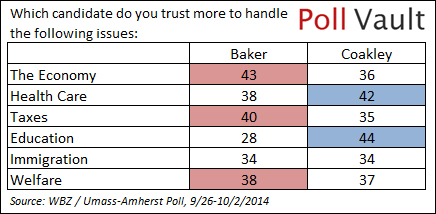Advertisement
Analysis: Issues Keeping Governor's Race Close
The polls released over the last week or so contain serious warning signs for the Martha Coakley campaign. Our latest WBUR tracking poll has the Democratic attorney general at 41 percent favorable and 39 percent unfavorable overall, and she is "underwater" with unenrolled voters (35 percent favorable, 40 percent unfavorable). And it is Republican Charlie Baker, not Coakley, who has the better favorability ratio with women, the crucial voting bloc that has kept Democrats on the winning side over the last few statewide elections.
Partially as a result of these dynamics, the polls have shown Coakley's pre-primary lead over Baker has evaporated. The latest horse race numbers range from a tossup to a 6-point lead for Baker. With the numbers looking this grim for Coakley, it is worth asking: How is the race even close at this point?
Part of the answer has to do with the natural advantages Democrats enjoy in Massachusetts. Democrats have a 3-to-1 advantage in party registration over Republicans. That numerical advantage, combined with the dominance of the party in virtually every other elected office, gives Democrats a significant advantage in the ground game of getting voters to the polls on election days. If the beginning of each election cycle were a footrace, Democrats would be off to a running head start while Republicans are just tying their shoelaces.
In addition to the structural factors, it appears that voters' perceptions of the candidates' positions on the issues is keeping the race close. In all three of the polls released this week, voters see Coakley as better on a number of the issues they care about, and Baker on others. Voters may like Baker more than Coakley right now, but the data suggests voters see this election as more than just a personality contest.
The 2012 U.S. Senate race illustrates this point. If that race had been about likeability, Scott Brown would be campaigning around the country for other Republicans right now, instead of fighting to get back to the Senate from New Hampshire. Brown ended up with higher favorable ratings than Elizabeth Warren but lost, in no small part because voters were closer to Warren on the issues, and thought she was more likely to stand up for them in the Senate.
Coakley is facing more serious problems with her favorability than Warren was, so the comparison is not perfect. But for the moment, there are a set of issues keeping the race within reach for Coakley.
In this past week's poll, we examined a series of issues, asking voters whether a candidate making that issue a priority would make them more or less likely to vote for that candidate. The two highest rated issues were making state government function better and making higher education more affordable.
[asset]2014/1008_gov-race-issues/[/asset]
Managing state government has become a theme in this election, popping up again and again as a top concern in polls and making its way into candidates' stump speeches and debate performances. Among voters who want the next governor to make management a high priority, Charlie Baker leads by 8 points.
But Coakley leads on the other two of the top three issues, and she has a commanding, 19-point margin among those who prioritize higher education. Looking at all the issues we tested shows a nearly even split, with four of the nine going to Baker, and five to Coakley.

Monday's UMass Amherst survey asked a similar question in a different way. Asked which candidate they trusted more on a battery of issues, voters split evenly on the top four issues, favoring Baker on the economy and taxes and Coakley on health care and education. It is partly this divide that is keeping the race close.
There is also a strong socioeconomic component to the race. Martha Coakley holds a wide lead among those with annual household incomes under $75,000, while Baker leads among upper income groups. It’s no mystery why. A brief glance at the issues each income group care about show a very different set of priorities, and one matches better with Coakley.
Some of this is natural partisan: wealthier voters care about taxes and tend to be Republicans, while lower income voters care about health care and education and lean Democratic. What will likely decide the election is which issues resonate most with the remaining undecided voters. The top issues with undecided voters in our poll were taxes and welfare reform (advantage Baker), and health care and higher education (Coakley). The management issue was less important to undecided voters.
Beating Baker on the issues voters care most about will not be enough to stem the tide if the demographics continue to shift under Martha Coakley's feet. With the race already in toss-up territory, she simply cannot sustain further losses among women or Democrats. Recent Democratic victories have featured large margins among women, including the 24 point wipeout Baker suffered at the hands of Deval Patrick in 2010. Given the current polling, it does not look like Coakley will repeat that performance with female voters. Her campaign may be taking on water, but right now it's the issues in the race that are keeping her afloat.